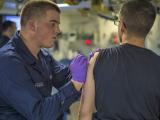Mar 4, 2003 (CIDRAP News) The Centers for Disease Control and Prevention (CDC) announced it is mailing information packets about smallpox to 3.5 million physicians and other healthcare workers in a continuing effort to educate them about the disease and the vaccine.
Physicians, physician assistants, nurse practitioners, and registered nurses (RNs) will receive the packets over the next 2 weeks, said Lynn Steele, MS, senior adviser for education and training in the CDC's Office of Terrorism Preparedness and Emergency Response in Atlanta.
"The mailings started yesterday, but not all 3.5 million clinicians will get them today," Steele told CIDRAP News. "People will start receiving them today. The purpose is just to raise awareness and point people to additional resources." The mailing will include an invitation for recipients to sign up to receive e-mail updates on terrorism preparedness topics and training opportunities, the CDC said.
The mailing comes about 5 weeks into the CDC's effort to vaccinate roughly 450,000 healthcare workers to serve on smallpox response teams in case terrorists release the virus. Only about 7,300 workers had been vaccinated as of Feb 27; the campaign has been slowed by workers' concern about the lack of a nationwide system to compensate them for possible ill effects of the vaccine.
The information packets include three pieces:
- A poster with color pictures to help clinicians assess patients who have symptoms that could suggest smallpox
- A pocket guide to smallpox vaccination, with color pictures and information about vaccination methods, responses to the vaccine, and adverse reactions
- A 3-page vaccine information statement discussing who should be vaccinated and the associated risks
In a news release, CDC Director Julie Gerberding said, "This mailing is unprecedented and the information in these packets is a valuable resource to those healthcare providers on the frontlines who would be the first ones to recognize smallpox cases."
Steele said the packets are being sent to all physicians, physician assistants, nurse practitioners, and RNs on lists provided by the state licensing boards for those groups. "We let the states determine how they wanted to distribute the packets," she said. In about half the states, the CDC is sending the packets directly to clinicians; in the rest, the CDC is sending packets to the state health departments, which will then mail them to healthcare workers with a cover letter or other supplementary material.
RNs were included in the mailing because so many are in primary care settings, Steele said. "Most licensing boards could not segment the RNs" into clinical and nonclinical jobs, so all were included, she explained.
The e-mail registry mentioned in the packets "will provide real-time information to help health care professionals prepare for possible terrorism events," the CDC release states. Steele said the e-mail service will be used to inform clinicians about things like changes in clinical guidance. It could also be used to provide information about emergencies, though state and local health departments have other mechanisms for doing that, she said.
"What we learned during the anthrax attacks was that they [clinicians] didn't mind receiving duplicate information, as long as it was the same information from the same source" and was relevant to the problem, Steele said.
She also noted that clinicians can join the e-mail registry by completing a form that has just been added to the CDC Web site (http://www.bt.cdc.gov/clinregistry/index.asp).




















